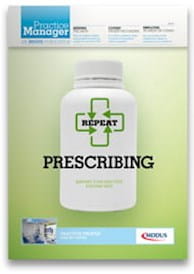A patient uses a smartphone to record a consultation. Is this legal?
LAST February a Shropshire GP appeared before a GMC fitness to practise panel charged with – among other things – carrying on a sexual relationship with a vulnerable patient. Nothing about the hearing was particularly unusual as such cases go apart from the fact that the most damning evidence to emerge came from two covert audio recordings made on the patient’s mobile phone.
Played out at the hearing the patient is heard to ask during a consultation at the GP surgery “Well. Have you missed me?” to which the doctor replies “Ah come here” followed by the sound of kissing and heavy breathing. Considering all the evidence in the case the panel found the doctor’s fitness to practise seriously impaired and he was erased from the Medical Register.
Not to take anything away from the serious misconduct exposed in the case but it does illustrate the risk practice staff now face as technology makes it increasingly easy for patients to secretly record consultations. Most mobile phones and smartphones have record functions which can be easily activated without a doctor or nurse realising. Even hand-held games consoles can record conversations, as one GP recently discovered when a child managed to capture a consultation with his mother – not just audio but video. The footage was deleted immediately on discovery.
LEGAL OR NOT?
The General Medical Council is very clear on the responsibilities of doctors wishing to record patient consultations for any reason. Its detailed guidance on making and using visual and audio recordings states: “You must get the patient’s consent to make a recording that forms part of the investigation or treatment of a condition, or contributes to the patient’s care, except in the circumstances described in paragraph 10 [where implied consent applies]. You should explain to the patients why a recording would assist their care, what form the recording will take, and that it will be stored securely.”
The same however is not true when a patient wishes to make a recording of a consultation. Says MDDUS dental adviser Rachael Bell:
“You might think that a patient would require your permission to record a consultation and that any recording made covertly was illegal. But this is not the case. When a patient seeks a consultation, the information being processed is almost exclusively relating to the patient. Under the Data Protection Act, that data is therefore personal to the patient. By recording it, that patient is merely viewed as processing their own data.”
This means the data is confidential to the patient but not to the doctor and there is no law against the patient doing with it as they please – including disclosing it to a third party or even posting it on the internet. Subject to forensic checks by IT experts to ensure no fakery is involved, such recordings could be used as evidence in both regulatory hearings and civil lawsuits. Such was the case in the GMC hearing of the errant Shropshire GP and also recently in another case in the USA in which a group of siblings secretly recorded a meeting with a doctor who apologised and admitted fault on the part of his hospital in the death of their father by cardiac arrest.
“In essence, the patient can do what they wish with it,” says Bell. “Even if obtained covertly, courts may view the recording, if relevant to the case, as admissible. Any covert recording would seem inherently intrusive and a breach of trust in a patient-dentist relationship. You would expect sympathy for a doctor or dentist whose privacy had been invaded. However, the law views the matter differently.”
WHAT CAN YOU DO?
Much as you might like to ban mobile devices at the door this is hardly a practical or legal solution. Covert recording is not something that can be easily policed and even if a patient is confronted with their finger on the record button it would be inadvisable to refuse treatment on that basis.
Perhaps the most practical advice is to accept the prospect of covert recording as a product of the digital age and ensure that it does not work against you. All practice staff should at all times act with courtesy and professionalism. A recording made in proper context is in one sense no more than a very accurate record of that professionalism. Supplemented with clear and complete patient notes a digital recording should not be anything to fear – much as it may not be exactly conducive to mutual trust.
Jim Killgore is publications editor at MDDUS
This page was correct at the time of publication. Any guidance is intended as general guidance for members only. If you are a member and need specific advice relating to your own circumstances, please contact one of our advisers.
Read more from this issue of Practice Manager

Save this article
Save this article to a list of favourite articles which members can access in their account.
Save to library